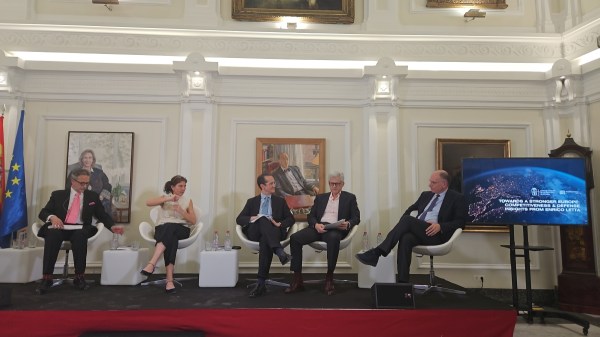RELATED POSTS
The situation of economic and social change brought about by Covid-19 offers a great opportunity that we cannot miss. It gives us the possibility to design a fair, inclusive and sustainable recovery to build back better our economies and societies. With this in mind, the latest programme of “A country for…”, organised by El País in collaboration with Telefónica, analyses the more social and political aspects of digitalisation, which requires a new model of governance, still under construction.
The “normality” prior to the start of the pandemic has not yet been recovered, but will it return at some point? and will it make sense to continue as if nothing had happened? Daniel Innerarity (Professor of Political and Social Philosophy), Itziar de Lecuona (Deputy Director of the Bioethics and Law Observatory of the UNESCO Chair in Bioethics at the University of Barcelona) and Christoph Steck (Director of Public Policy and the Internet at Telefónica) reflect on the most pressing risks of today’s digital society and the need to establish a new social contract.
Influenced by the thought of Ulrich Beck, Daniel innerarity explains that today’s society is marked by interdependence and risk, where it is difficult to find “safe spaces”. This situation is aggravated by the lack of long-term strategies that go beyond the ephemerality established by electoral deadlines, which translates into a lack of overall vision. In turn, he points to the need to address the mismatch between technology and governance, while advocating for a digital space for citizens and not only at the service of business.
“Technology is often smarter than governments, especially because of the slowness of those who regulate”, Daniel Innerarity.

Itziar Lecuona delves into the issue of privacy and security and warns of the growing disaffection with caring for personal data. On how to reverse the trend towards the commercialisation of personal data, this expert offers two solutions: regulations to improve the current framework and digital literacy to raise awareness of the importance of protecting data.
“We need to take back control of data in the digital society. To do this, it is essential to demand transparency and accountability,” said Itziar Lecuona.
Finally, Christoph Steck highlights the acceleration of the digital transformation process in the last year, where a large part of our “physical” life has moved into the digital space. These dizzying changes have highlighted the need for new forms of collaboration to take advantage of the possibilities offered by connectivity and digitisation to generate value.

“We are at a turning point where the public and private sectors must work together”, Christoph Steck.
Faced with this reality, Telefónica is proposing a new Digital Deal to lay the foundations for a new digital society that is more inclusive, fair and sustainable. To achieve this goal, there is no single solution, but rather different aspects on which to continue working collaboratively. These include the following five pillars:
- Making societies and economies more sustainable through digitalization, supporting key sectors, technologies and innovation, accelerating the green transition and the digitalisation of small and medium-sized enterprises and public administrations.
- Tackling inequalities by investing in digital skills and adapting the welfare systems, upgrading and reskilling people, modernising education and reforming labour and social protection frameworks.
- Building an inclusive and sustainable connectivity by strengthening and investing in the very high capacity networks that have proven to be critical for future competitiveness, while also investing in the deployment of green networks.
- Ensuring fair competition by modernising the fiscal, regulatory and competition frameworks in all key elements of the digital economy.
- Improving confidence by an ethical and responsible use of technology, respecting privacy, security and other digital rights in a data economy, as well as adopting a risk-based approach to the use of Artificial Intelligence.











